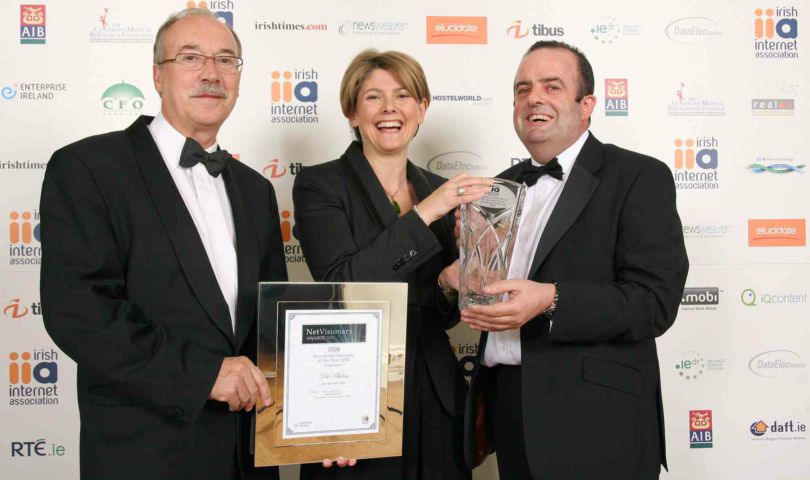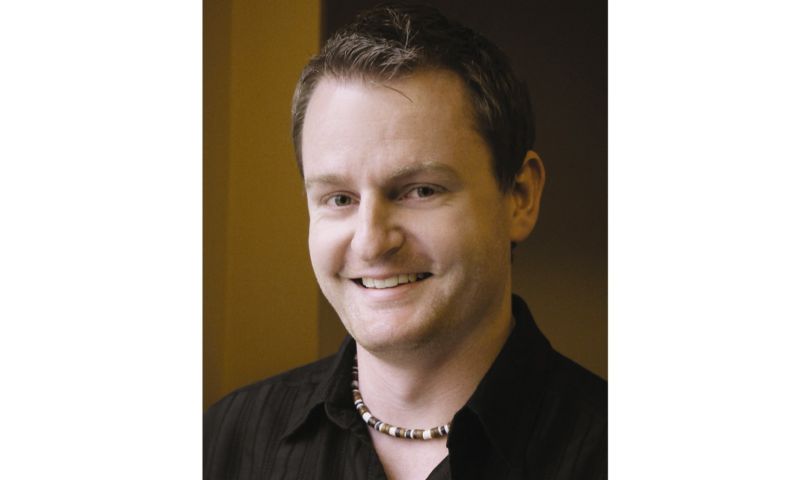Not many entrepreneurs become millionaires by the age of 30. Chris Kennedy, who turned 31 in January, reached that happy landmark last December when Cork startup Trustev was bought by American public company TransUnion.
Trustev was founded in August 2012, so it was a quick score for Kennedy, a graduate of the Business Information Systems degree at University College Cork. One reason for Kennedy’s success is that he is a very good coder who knows his way around working a variety of software technologies.
The other clever thing Kennedy did was hitch his star to Pat Phelan, a seasoned entrepreneur who is two decades Kennedy’s senior.
According to Trustev’s February 2015 annual return, Kennedy and Phelan each owned 43.5% of the equity in the company. The next largest shareholder was Corkman Liam Casey, who has had huge success with his PCH manufacturing and logistics company in China, and who helped fund Trustev in exchange for a 10% stake.
On the face of it, Kennedy and Phelan (50) managed to hold onto the bulk of the Trustev equity as they brought the company to market. Filed accounts suggest that most of the funding for operations was in the form of loan finance; the August 2014 balance sheet shows outstanding loans of €3.8m.
If that’s the case, then Kennedy, Phelan and Casey shared the €19m cash paid at closing, along with three other shareholders who had 3% of the equity between them. The earn-out agreement calls for payment of an additional €21m contingent on Trustev achieving retention, revenue and operating profit targets through to 2018.
Reducing Fraud
What TransUnion wanted was the product that Kennedy dreamt up, which has the objective of reducing retail credit card fraud by triangulating a user’s social media activity, website behaviour and transaction history.
According to Kennedy, the ‘social fingerprinting’ technology uses proprietary algorithms to analyse data sources such as activity and interactions on social networks, email address, IP, location and transaction history to create a Trustev score for the individual.
This rating can be benchmarked to allow or deny a transaction or flag it for manual review. For online retail vendors, the technology reduces the number of transactions sent for manual review, creating substantial cost savings.
“We look for patterns in the data that would identify whether or not someone is a real, identifiable human being or just an artificial identity created by an automated process,” Kennedy explains.
Jim Peck, TransUnion’s chief executive, observes: “Holistic information is a powerful tool to help our customers approve good transactions and prevent fraud, and Trustev’s innovative capabilities are at the forefront of technology in this increasingly critical field.
“With Trustev’s online risk analytics and TransUnion’s deep datasets, the combined platform offers customers new levels of confidence to support account acquisition, account management and digital payments.
"TransUnion has now integrated Trustev technology into its ID Manager product, and customers have experienced up to a 60% decrease in fraud losses while boosting approvals.”
Kennedy had the idea for the algorithm that underpins Trustev when working for Cubic Telecom, Phelan’s previous business venture. “In Cubic we became very aware of the huge problem of online fraud and the ticking time bomb it presented to the growth of online commerce,” Kennedy recalls.
“I left Cubic to work full-time on developing a solution, and after 12 months the first build of Trustev was launched. In 2012, Pat left Cubic Telecom to join Trustev as chief executive.”
Phelan is obviously a decent talent spotter, as he hired Kennedy for Cubic in 2007. The young graduate assumed responsibility for developing Cubic Telecom’s white label portal solution, custom management backend and dashboard, and a suite of APIs.
He might have been able to do Trustev on his own, but the company story illustrates the benefits that can flow when the young gun teams up with a wise old fox.
Butcher Boy
If his parents had their way, Pat Phelan would be working today behind a meat counter. From Ballyphehane in Cork, Phelan took on a part-time job as a butcher boy in the city’s English Market while still in school.
At 16, having done well in his Inter Cert and looking forward to the senior cycle, his parents hauled him out of school and into a butcher’s apprenticeship, which they saw as a future-proof career.
After struggling to find work when he qualified as a butcher, Phelan worked for a time in his father’s pub. Following that, Phelan cycled through short-term jobs wherever he could get them, as growing alcohol dependence took over his life. Married at 21, Phelan was all but lost to alcohol by his mid-twenties.
“I was Cork’s oldest petrol boy,” says Phelan, who by that stage had left home and was slumming in bedsits. That lifestyle continued until New Year’s Eve 1999, when Phelan vowed to banish the booze. He joined AA and hasn’t touched a drop since.
Phelan set about putting his working life in order. He began training as a chef in a Thai restaurant in Cork, and while heading back from a training stint in Bangkok he met an Irish businessman who ran a recruitment agency in Malaysia.
The two struck a deal to bring staff from Kuala Lumpur to Ireland to work in catering. Back home, Phelan convinced the owner of the restaurant he worked in to establish a recruitment company to bring staff over from Kuala Lumpur.
When the Malaysian immigrants complained about the cost of phoning home, Phelan set up an internet café/phone centre called Talkworld in 2001, later renaming the business as Fonehome. Working fulltime on his new telco venture, Phelan grew Fonehome to eight outlets, using a VOIP setup he helped design for cheap online calls.
Related offshots sprung from Phelan’s early entrepreneurial endeavours, variously offering cheap phone cards and online calls. He was director of Starfish Telecom from 2004 to 2006, which sold call cards on several airlines, and he also founded Excel Collections in 2002, a phone card company that worked with multiple carriers.
Other ventures launched by Phelan included the website Tele99.com, which provided unique access numbers to users to effect savings on international calls. The ventures had obvious international growth potential but they were financial small fry.
Roaming Charges
Phelan’s commercial endeavours ratcheted up a few notches with the introduction of Roam4Free, which was launched in 2007. Users bought a SIM card that they could use in their phones to operate the Roam4free system.
Phelan explained at the time: “If someone in France takes lots of calls from Ireland, he can insert our SIM card attached to a European mobile number into their cell phone. Any calls received from Ireland would then be treated as a local call and there would be zero roaming charges.” Roam4free SIM cards were sold for €20 a pop, with call credit topped up online.
Roam4free was rebranded as Maxroam and the business operated through Cubic Telecom Ltd. Phelan was a charter investor in this company with a 34% stale, along with Tony Duncan (33%) and Alan Keane (33%).
At the end of 2008, Phelan received the Irish Internet Association’s Net Visionary award at a black-tie dinner in Royal Hospital Kilmainham. The award citation mentioned Phelan’s outstanding contribution to the mobile internet.
However, by that stage Phelan’s equity in Cubic Telecom had been diluted, as Miami company Global Roaming Inc came on board for a 50% stake. Cubic Telecom gobbled up cash, running up losses of €970,000 by the end of 2008.
In December 2008, Irish company BPI Telecom first appeared on Cubic’s share register, and BPI continued to pump money into Cubic in subsequent years.
By December 2012, Cubic Telecom’s losses had accumulated to €7.6m. With Trustev on the launch pad, Phelan resigned as a director of Cubic Telecom in January 2013 and sold his 1.4% stake to the company a few months later.
Maxroam is still going strong. Its entry-level bundle costs €29 and includes 200 voice minutes, 200 texts and 500MB of data for use anywhere in the world. Cubic Telecom is also now playing for much bigger stakes.
The much-touted Internet of Things is about machines communicating with each other, and to do that you need SIM cards, something Cubic knows a lot about. In recent years, Cubic Telecom has received large investment from chip maker Qualcomm, and in 2015 Audi came on board too.
Another Phelan venture cited in his 2008 award was Twitterfone, a service that converted voice messages to text for sending on to a network of Twitter users for the price of a local call.
A beta version of Twitterfone was launched by Phelan simultaneously in the US, UK and Ireland. Sean O’Sullivan was an investor but Twitterfone never caught on, despite winning awards for its website design. It was shelved after 18 months.
The venture wasn’t Pat Phelan’s only misstep. While Cubic Telecom was on its global expansion mission, Phelan recalls missing the buzz of the restaurant trade so much that he took over the lease of an eatery in Cork city. Along with long-time business partner Tony Duncan, Phelan ploughed money into a refit of the premises and recruitment.
“I had only experience of the food side and most nights myself and Tony were the only customers,” says Phelan. “It was a very steep learning curve and we lost a small fortune in the six months that we were open. We took a very large personal loss and it nearly took down our telecoms business with it.”
Trustev
Then came Trustev. While Chris Kennedy built the product and tweaked it, Pat Phelan looked after the fundraising and commercial aspects of the business. The company was accepted onto Telefonica’s Wayra accelerator programme in Dublin, providing access to experienced advisors such as gaming entrepreneur Dylan Collins and London-based Anil Hansjee, who used to direct venture investments for Google and became a shareholder in Turstev.
In its first year in business, Trustev ran up a loss of €387,000. The loss expanded to €1.4m in the year to August 2014 but the filed accounts signalled that the product had found a ready market, with year-end debtors amounting to €990,000, compared with €48,000 a year earlier.
Crucially, according to company filings, Phelan funded trading losses with loan capital from unidentified lenders rather than by issuing equity.
In 2015, Trustev was mulling an equity funding round when TransUnion made its move. The two companies had been working together, according to Phelan.
“We worked really well with them – they gave us a lot more information to work with than we previously had. Chris and I met the firm, got to know them and it looked like a really good coming together.”
After the deal, Phelan and Kennedy have remained on with TransUnion to progress their substantial earn-out, as have Trustev’s 30 staff in Cork and ten in New York. Phelan, who now lives in New York, dispenses his business wisdom via to-the-point tweets for his 19,000 followers, as well as at tech conferences and gatherings in the US and abroad.
Phelan maintains: “I will do something else but we have a responsibility to the company that bought us to ensure we hit our targets for the next three years. I listen a lot and I talk to a lot of people, to try to see early curve stuff.”
Among the innovations to have interested Phelan of late? An artificially intelligent secretary that can read email exchanges and other communications, then set up meetings and perform admin work automatically. “It does all the work, so you have to do nothing,” he enthuses.
Photo: Pat Maher (left), Enterprise Ireland; Maeve Kneafsey, IIA, and Pat Phelan, accepting his Net Visionary award in 2008









